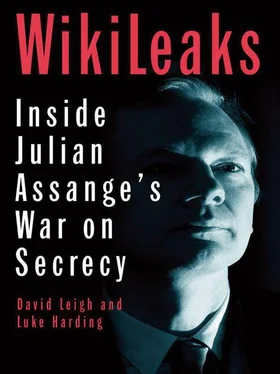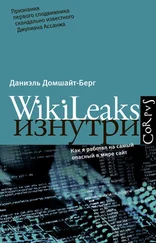Harding, Luke - WikiLeaks - Inside Julian Assange's War on Secrecy
Здесь есть возможность читать онлайн «Harding, Luke - WikiLeaks - Inside Julian Assange's War on Secrecy» весь текст электронной книги совершенно бесплатно (целиком полную версию без сокращений). В некоторых случаях можно слушать аудио, скачать через торрент в формате fb2 и присутствует краткое содержание. Жанр: Старинная литература, на английском языке. Описание произведения, (предисловие) а так же отзывы посетителей доступны на портале библиотеки ЛибКат.
- Название:WikiLeaks: Inside Julian Assange's War on Secrecy
- Автор:
- Жанр:
- Год:неизвестен
- ISBN:нет данных
- Рейтинг книги:3 / 5. Голосов: 1
-
Избранное:Добавить в избранное
- Отзывы:
-
Ваша оценка:
- 60
- 1
- 2
- 3
- 4
- 5
WikiLeaks: Inside Julian Assange's War on Secrecy: краткое содержание, описание и аннотация
Предлагаем к чтению аннотацию, описание, краткое содержание или предисловие (зависит от того, что написал сам автор книги «WikiLeaks: Inside Julian Assange's War on Secrecy»). Если вы не нашли необходимую информацию о книге — напишите в комментариях, мы постараемся отыскать её.
WikiLeaks: Inside Julian Assange's War on Secrecy — читать онлайн бесплатно полную книгу (весь текст) целиком
Ниже представлен текст книги, разбитый по страницам. Система сохранения места последней прочитанной страницы, позволяет с удобством читать онлайн бесплатно книгу «WikiLeaks: Inside Julian Assange's War on Secrecy», без необходимости каждый раз заново искать на чём Вы остановились. Поставьте закладку, и сможете в любой момент перейти на страницу, на которой закончили чтение.
Интервал:
Закладка:
That might have been the end of the story. But the two aggrieved women appointed a high-profile lawyer on their own behalf, Claes Borgström, former Swedish equal opportunities ombudsman and prominent Social Democrat politician. He got both cases reopened, as law allowed, by appealing to a chief prosecutor ( överåklagare ), the sex crimes specialist Marianne Ny. He told a news agency the women didn’t even know it was possible to appeal a prosecutor’s decision until he so advised them. “I had read the police reports. I had seen my clients and heard their stories,” Borgström said. “In my opinion, it was rape and attempted rape or sexual molestation.” He added: “We have better knowledge than other countries in the field of gender equality … That also means women don’t accept certain things in the same way they do in other countries.”
Not surprisingly, Assange was much dismayed. Facing a further interrogation about his unhappy one-night stand with the second woman, Katrin Weiss, he decided to leave town. He told friends he feared being arrested and paraded in front of a media circus. Subsequently, he circulated the idea that the resultant demand for his extradition was the result of covert pressure from the US government, who wanted to get their hands on him for the WikiLeaks exploits. No concrete evidence has yet surfaced to support this theory, although the US has threatened repeatedly that it will seek to bring its own indictment against Assange for information crimes. The claim certainly muddied the WikiLeaks waters, as conspiracy theories began to rage up and down the internet.
That summer, contemplating the imbroglio in Sweden from afar, the Guardian ’s reporters in London were also dismayed. Leigh and Davies took a decision that it was nevertheless their duty to ensure the Guardian was steadfast – and indeed first – in reporting the facts. What happened in Stockholm may have been complex and equivocal, but some questionable sexual encounters had certainly occurred, and there was no evidence to support the claims of dirty tricks and honeytraps. The journalists were acutely aware that to ignore the fresh controversy that had erupted around their new collaborator could only increase the risk that it might taint the WikiLeaks enterprise as a whole.
CHAPTER 13
Uneasy partners
Editor’s office, the Guardian , Kings Place, London
1 November 2010
“ I’m a combative person ”
JULIAN ASSANGE, TED CONFERENCE, OXFORD, 2010
The three partner papers decided it was time for a meeting with Julian Assange. Everything was threatening to get rather messy. The embattled WikiLeaks founder now wanted the Americans frozen out of the much-delayed deal to publish the diplomatic cables jointly – a punishment, so it was said, for a recent profile of him, by the New York Times veteran London correspondent John F Burns. Assange had intensely disliked it.
The British were anxious about the fact that another copy of the cables had apparently fallen into the hands of Heather Brooke, a London-based American journalist and freedom of information activist. And the Germans were worried that things could get acrimonious all round unless the editors held a clear-the-air meeting with what was left of WikiLeaks.
There were at least three loose copies of the cables believed to be circulating now: with Brooke in the UK, Daniel Ellsberg – of Pentagon papers fame – in the US, and Smári McCarthy, an Icelandic former WikiLeaks programmer who had, according to Assange, let a copy pass to Brooke. David Leigh had signalled to the New York Times he was willing personally to hand them a copy if Assange would not co-operate. But none of the huge secret cache of state department dispatches had yet actually been analysed and published to the world as originally planned. Would the whole audacious project end in tears?
The conference was arranged for 1 November, at the Guardian ’s London offices near King’s Cross station, with an initial meeting to go through the material in detail, trying to reach agreement on a possible day-by-day running order. Assange was supposed to join around 6pm – but a series of text messages to deputy editor Ian Katz indicated he was running late. Around 7pm, Rusbridger’s phone rang. It was Mark Stephens, a British libel lawyer he’d known for years. He said he had something to tell him: could he come straight round? Twenty minutes later Stephens burst through the door of the editor’s office, followed by Assange himself, along with his dour Icelandic lieutenant Kristinn Hrafnsson, and a young woman lawyer, later introduced as a junior solicitor in Stephens’ office, Jennifer Robinson. It looked, and felt, like an ambush.
Assange had barely sat down before he started angrily denouncing the Guardian . Did the New York Times have the cables? How did they have them? Who had given them to them? This was a breach of trust. His voice was raised and angry. Every time Rusbridger tried to respond, he pitched in with another question. When he finally paused for breath Rusbridger pointed out that the Spiegel people and other Guardian executives were waiting. Why didn’t we tell them to come in to continue the discussion? But Assange’s fury returned: this matter had to be settled first. He needed to know the truth about the New York Times . “We are getting the feeling that a large organisation is trying to find ways to step around a gentlemen’s agreement. We’re feeling a bit unhappy.”
Rusbridger responded that things had changed. WikiLeaks had sprung a leak itself. The cables had fallen into the hands of Heather Brooke. Things would soon move out of our control unless they decided to act more quickly. Assange didn’t look well. He was pale and sweating and had a racking cough. Rusbridger stuck to the line that he hadn’t given anyone the cables – which was perfectly true – and eventually persuaded Assange that it was better to deal with the larger group.
David Leigh immediately objected, however, to the presence of Stephens and Robinson. This was an editorial meeting, he protested. If Assange was going to have lawyers there, the Guardian needed lawyers. Rusbridger went off to try and raise a lawyer. The Guardian ’s head of legal was cycling home and could not hear her BlackBerry ringing, so Geraldine Proudler, from the legal firm Olswang, who had fought many battles on behalf of the Guardian in the past, was interrupted at her gym and jumped in a taxi.
The argument – for the moment without lawyers – began again with the Spiegel team of editor-in-chief Georg Mascolo, Holger Stark and Marcel Rosenbach. Assange seemed obsessed with the New York Times , however, and launched into repeated denunciations of the paper.
“They ran a front-page story – the front page! – a front-page story which was just a sleazy hit job against me personally, and other parts of the organisation, and based upon falsehoods. It wasn’t even an assemblage of genuine criticism, assembling criticism without any balance. Their aim is to make themselves look impartial. It is not enough to simply be impartial. It is not enough to simply go: ‘That’s the story’ and put it through – they actually have to be actively hostile towards us, and demonstrate that on the front page, lest they be accused of being some kind of sympathiser.”
The Burns profile had dwelt, among other things, on the continuing police investigation into the Swedish sex allegations. Assange was quoted saying: “They called me the James Bond of journalism. It got me a lot of fans, and some of them ended up causing me a bit of trouble.”
Burns had written that WikiLeaks staff had turned against Assange in the scandal’s wake. They complained, he wrote, that their founder’s “growing celebrity has been matched by an increasingly dictatorial, eccentric and capricious style”. To one defector, 25-year-old Icelander Herbert Snorrason, Assange messaged: “If you have a problem with me, you can piss off.” Assange had announced: “I am the heart and soul of this organisation, its founder, philosopher, spokesperson, original coder, organiser, financier, and all the rest.” Snorrason riposted stoutly: “He is not in his right mind.”
Читать дальшеИнтервал:
Закладка:
Похожие книги на «WikiLeaks: Inside Julian Assange's War on Secrecy»
Представляем Вашему вниманию похожие книги на «WikiLeaks: Inside Julian Assange's War on Secrecy» списком для выбора. Мы отобрали схожую по названию и смыслу литературу в надежде предоставить читателям больше вариантов отыскать новые, интересные, ещё непрочитанные произведения.
Обсуждение, отзывы о книге «WikiLeaks: Inside Julian Assange's War on Secrecy» и просто собственные мнения читателей. Оставьте ваши комментарии, напишите, что Вы думаете о произведении, его смысле или главных героях. Укажите что конкретно понравилось, а что нет, и почему Вы так считаете.












